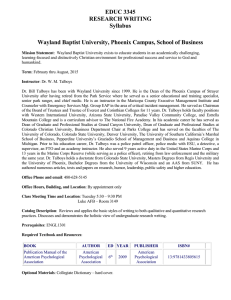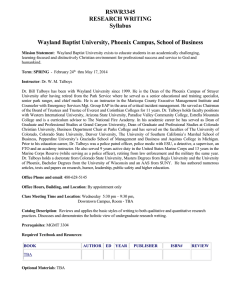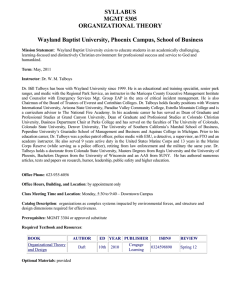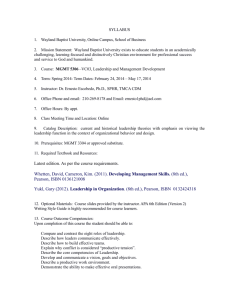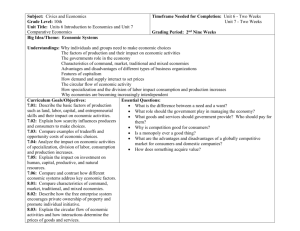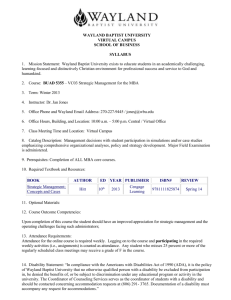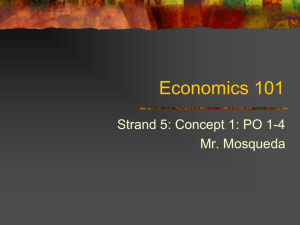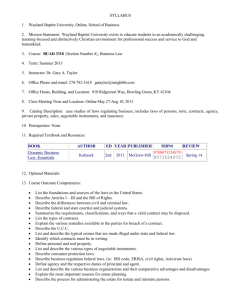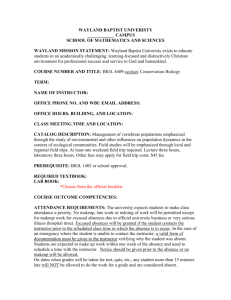MGMT5316 - Wayland Baptist University
advertisement
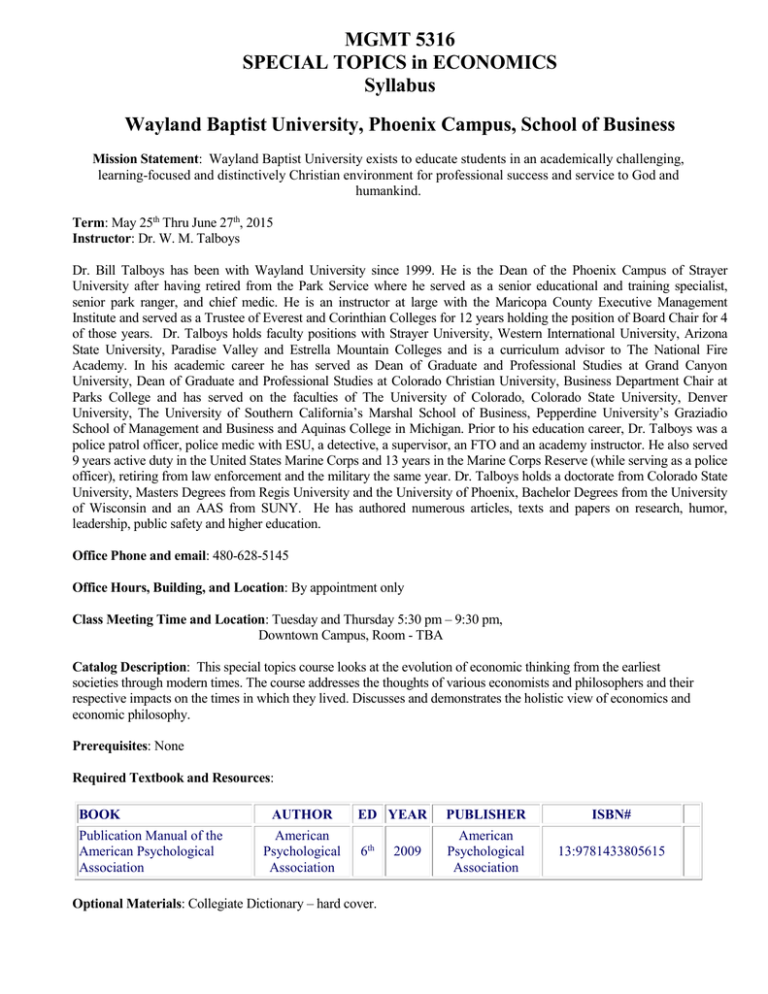
MGMT 5316 SPECIAL TOPICS in ECONOMICS Syllabus Wayland Baptist University, Phoenix Campus, School of Business Mission Statement: Wayland Baptist University exists to educate students in an academically challenging, learning-focused and distinctively Christian environment for professional success and service to God and humankind. Term: May 25th Thru June 27th, 2015 Instructor: Dr. W. M. Talboys Dr. Bill Talboys has been with Wayland University since 1999. He is the Dean of the Phoenix Campus of Strayer University after having retired from the Park Service where he served as a senior educational and training specialist, senior park ranger, and chief medic. He is an instructor at large with the Maricopa County Executive Management Institute and served as a Trustee of Everest and Corinthian Colleges for 12 years holding the position of Board Chair for 4 of those years. Dr. Talboys holds faculty positions with Strayer University, Western International University, Arizona State University, Paradise Valley and Estrella Mountain Colleges and is a curriculum advisor to The National Fire Academy. In his academic career he has served as Dean of Graduate and Professional Studies at Grand Canyon University, Dean of Graduate and Professional Studies at Colorado Christian University, Business Department Chair at Parks College and has served on the faculties of The University of Colorado, Colorado State University, Denver University, The University of Southern California’s Marshal School of Business, Pepperdine University’s Graziadio School of Management and Business and Aquinas College in Michigan. Prior to his education career, Dr. Talboys was a police patrol officer, police medic with ESU, a detective, a supervisor, an FTO and an academy instructor. He also served 9 years active duty in the United States Marine Corps and 13 years in the Marine Corps Reserve (while serving as a police officer), retiring from law enforcement and the military the same year. Dr. Talboys holds a doctorate from Colorado State University, Masters Degrees from Regis University and the University of Phoenix, Bachelor Degrees from the University of Wisconsin and an AAS from SUNY. He has authored numerous articles, texts and papers on research, humor, leadership, public safety and higher education. Office Phone and email: 480-628-5145 Office Hours, Building, and Location: By appointment only Class Meeting Time and Location: Tuesday and Thursday 5:30 pm – 9:30 pm, Downtown Campus, Room - TBA Catalog Description: This special topics course looks at the evolution of economic thinking from the earliest societies through modern times. The course addresses the thoughts of various economists and philosophers and their respective impacts on the times in which they lived. Discusses and demonstrates the holistic view of economics and economic philosophy. Prerequisites: None Required Textbook and Resources: BOOK Publication Manual of the American Psychological Association AUTHOR American Psychological Association ED YEAR PUBLISHER ISBN# 6th American Psychological Association 13:9781433805615 Optional Materials: Collegiate Dictionary – hard cover. 2009 Competencies & Objectives Summarize issues effecting economic thought and understanding Describe three problems all economies have tried to solve through the ages Identify the changing attitudes of developing economies in the growth of evolving societies Analyze the evolutionary understanding of fiscal and monetary policy Evaluate the relationship between understanding of economics and the modernization of a society Define the changing understanding of supply and demand Outline the major factors that affected the growth of modern capitalism Describe the changing perspectives of value and its effect on economic decisions Relate the role of government in developing economies Course Outline • • • Role of economics in modern society Understanding the evolution of economic thought The changing focus and understanding of economics and modern fiscal systems. Attendance Requirements: You may miss a maximum of three (2) classes. Any work missed is your responsibility, not mine. If you are going to miss, make sure a classmate can get information for you. Any work due on class date is still due that day even if you are not in class. No late work is accepted under any circumstances.. Disability Statement: “In compliance with the Americans with Disabilities Act of 1990 (ADA), it is the policy of Wayland Baptist University that no otherwise qualified person with a disability be excluded from participation in, be denied the benefits of, or be subject to discrimination under any educational program or activity in the university. The Coordinator of Counseling Services serves as the coordinator of students with a disability and should be contacted concerning accommodation requests at (806) 2913765. Documentation of a disability must accompany any request for accommodations.” Course Outline Meeting One • Introductions, coverage of syllabus and other bureaucratic stuff. • What’s it all about, this economics thing? Meeting Two • What does economics do? • Discussion Question One Meeting Three • The questions the economies try to answer. Meeting Four • After the ice. • Barterism to Bullionism • Discussion Question Two Meeting Five • The Physiocrats • Tableau Economique Meeting Six • Classical and Neo-classical economics • Discussion Question Three Meeting Seven • The rise of modern economies Meetings Eight The rise of Modern economies (con’t.) Meetings Nine and Ten – Dead Economist Presentations Course Evaluation – (200 points) • • Assignments applying course concepts to practical research writing. Final proposal. Assessment and Scoring Discussion Question 1 Discussion Question 2 Discussion Question 3 Media Assignment Final Assignment 20 points 20 points 20 points 20 points 120 points The University has a standard grade scale A = 90-100%, B = 80-89%, C = 70-79%, D = 60-69%, F= below 60%, W = Withdrawal, WP = withdrew passing, WF = withdrew failing, I = incomplete. An incomplete may be given within the last two weeks of a long term to a student who is passing, but has not completed a term paper, examination, or other required work for reasons beyond the student’s control. A grade of “incomplete” is changed if the work required is completed prior to the last day of the next long (10 to 15 weeks) term, unless the instructor designates an earlier date for completion. If the work is not completed by the appropriate date, the I is converted to an F. Graduate students can figure their respective grades using a weighted factor of 1.2.
